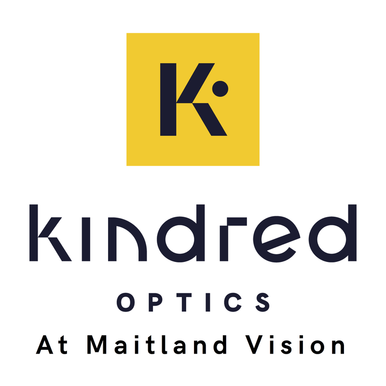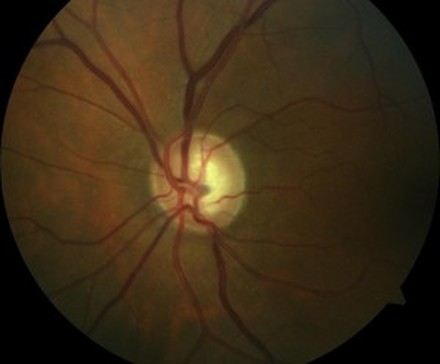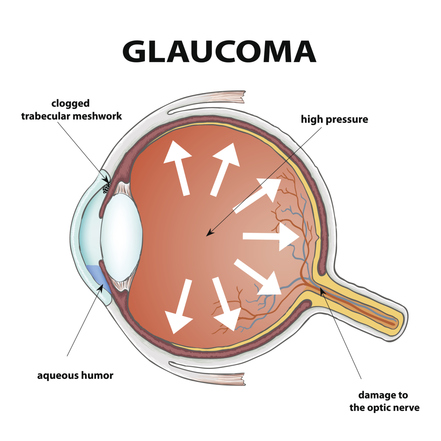Glaucoma
What is glaucoma?
Glaucoma is a serious eye disease. It occurs when the pressure inside the eye builds up and damages the optic nerve. The disease tends to affect peripheral vision first, which makes it very hard to detect via symptoms alone. Most people do not notice a change in their vision until they have lost as much as 40 percent of their sight.
What causes glaucoma?
The eye contains fluid, which enters and exits through a small area at the front of the eye. This fluid contains nutrients and other substances that nourish the eye and the surrounding tissues. When the small area that circulates the fluid gets clogged, it can cause the pressure in the eye to increase to unhealthy levels. This pressure build up slowly starts to damage the optic nerve, which can greatly diminish your vision in a relatively short period of time.
Are there any treatments for glaucoma?
There are treatments available for glaucoma. Early stages of the disease may simply require monitoring. Later stages can be treated with medications and surgery. Medications can be given in the form of pills or eye drops, which are designed to either slow the fluid entering the eye or increase the rate of drainage.
There are two types of surgeries available, including laser surgery and traditional surgery. Laser surgery involves opening the area that drains the fluid, using a strong beam of laser light. Laser surgery improves the rate of drainage, but may result in the need for additional surgeries as the benefits decrease over time. Individuals that receive laser surgery may still need to take pills or use eye drops.
Traditional surgery is used as a last resort. It is designed to help people who do not benefit from laser surgery, pills or eye drops. Our optometrist can explain the treatment options in more detail in the event excess pressure is detected in your eye.
Can glaucoma be prevented?
Glaucoma cannot be prevented. There are very few symptoms other than vision loss, and the disease can be quite advanced before the individual notices any change in vision. If you are over the age of forty and African American or over the age of 60 or have a family history of glaucoma, you should be tested every year. The only way to detect and treat glaucoma early is with annual testing.
How do I schedule an appointment with your eye doctor for glaucoma testing?
To schedule an eye examination and glaucoma test, call our Maitland office at 407-647-2020. We perform glaucoma tests with every examination.
Orlando Optometrists Treating Glaucoma
Glaucoma is a classification for a group of disorders that progressively damage the optic nerve and is the 2nd leading cause of blindness in the U.S.
The most common form of Glaucoma primary open-angle glaucoma slowly narrows the field of vision and may take a long time before it effects the center of vision. This makes glaucoma especially damaging because it often goes untreated until significant damage has been done. At our office, every patient is considered a glaucoma suspect until proven otherwise. We have incorporated the latest technology in the diagnosis and management of certain forms of glaucoma including, Optical Coherence Tomography (OCT), Threshold Visual Field Testing, Digital Retinal Photography, and Corneal Pachymetry.
Another type of glaucoma is acute angle closure glaucoma. While it is less common than open-angle glaucoma it is no less serious. In acute angle closure a rapid increase in pressure in the eye and severe vision loss can occur very quickly. Acute angle closure has many symptoms including potentially severe eye pain, redness, blurred vision and more.
Risk Factors
There are many things that can increase your chances of developing glaucoma and if one or more of the following applies, your risk is significantly higher.
Age – If you are over the age of 40 your chances of developing glaucoma increase and increasingly so after age 60
Race – People of African descent have an increased chance of developing glaucoma and those of Japanese descent have an increased chance of acute angle glaucoma
Family History – If there is a history of glaucoma in your family your risk is significantly higher
Physical injury to the eye
Corticosteroid use has been shown to increase the risk of glaucoma
Glaucoma cannot currently be prevented but with proper diagnosis and treatment it can often be controlled. Early detection is important because the damage is reversible. If you or someone you know thinks they are beginning to experience the symptoms of glaucoma it is important to have it checked out immediately. For a more in depth understanding of glaucoma visit the American Optometric Association’s website.
Glaucoma is a serious eye disease. It occurs when the pressure inside the eye builds up and damages the optic nerve. The disease tends to affect peripheral vision first, which makes it very hard to detect via symptoms alone. Most people do not notice a change in their vision until they have lost as much as 40 percent of their sight.
What causes glaucoma?
The eye contains fluid, which enters and exits through a small area at the front of the eye. This fluid contains nutrients and other substances that nourish the eye and the surrounding tissues. When the small area that circulates the fluid gets clogged, it can cause the pressure in the eye to increase to unhealthy levels. This pressure build up slowly starts to damage the optic nerve, which can greatly diminish your vision in a relatively short period of time.
Are there any treatments for glaucoma?
There are treatments available for glaucoma. Early stages of the disease may simply require monitoring. Later stages can be treated with medications and surgery. Medications can be given in the form of pills or eye drops, which are designed to either slow the fluid entering the eye or increase the rate of drainage.
There are two types of surgeries available, including laser surgery and traditional surgery. Laser surgery involves opening the area that drains the fluid, using a strong beam of laser light. Laser surgery improves the rate of drainage, but may result in the need for additional surgeries as the benefits decrease over time. Individuals that receive laser surgery may still need to take pills or use eye drops.
Traditional surgery is used as a last resort. It is designed to help people who do not benefit from laser surgery, pills or eye drops. Our optometrist can explain the treatment options in more detail in the event excess pressure is detected in your eye.
Can glaucoma be prevented?
Glaucoma cannot be prevented. There are very few symptoms other than vision loss, and the disease can be quite advanced before the individual notices any change in vision. If you are over the age of forty and African American or over the age of 60 or have a family history of glaucoma, you should be tested every year. The only way to detect and treat glaucoma early is with annual testing.
How do I schedule an appointment with your eye doctor for glaucoma testing?
To schedule an eye examination and glaucoma test, call our Maitland office at 407-647-2020. We perform glaucoma tests with every examination.
Orlando Optometrists Treating Glaucoma
Glaucoma is a classification for a group of disorders that progressively damage the optic nerve and is the 2nd leading cause of blindness in the U.S.
The most common form of Glaucoma primary open-angle glaucoma slowly narrows the field of vision and may take a long time before it effects the center of vision. This makes glaucoma especially damaging because it often goes untreated until significant damage has been done. At our office, every patient is considered a glaucoma suspect until proven otherwise. We have incorporated the latest technology in the diagnosis and management of certain forms of glaucoma including, Optical Coherence Tomography (OCT), Threshold Visual Field Testing, Digital Retinal Photography, and Corneal Pachymetry.
Another type of glaucoma is acute angle closure glaucoma. While it is less common than open-angle glaucoma it is no less serious. In acute angle closure a rapid increase in pressure in the eye and severe vision loss can occur very quickly. Acute angle closure has many symptoms including potentially severe eye pain, redness, blurred vision and more.
Risk Factors
There are many things that can increase your chances of developing glaucoma and if one or more of the following applies, your risk is significantly higher.
Age – If you are over the age of 40 your chances of developing glaucoma increase and increasingly so after age 60
Race – People of African descent have an increased chance of developing glaucoma and those of Japanese descent have an increased chance of acute angle glaucoma
Family History – If there is a history of glaucoma in your family your risk is significantly higher
Physical injury to the eye
Corticosteroid use has been shown to increase the risk of glaucoma
Glaucoma cannot currently be prevented but with proper diagnosis and treatment it can often be controlled. Early detection is important because the damage is reversible. If you or someone you know thinks they are beginning to experience the symptoms of glaucoma it is important to have it checked out immediately. For a more in depth understanding of glaucoma visit the American Optometric Association’s website.
Location |
|


